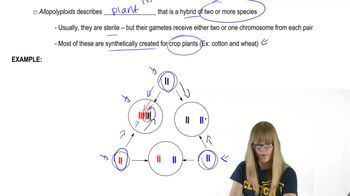Which of the following mutations changes one codon to a chemically different amino acid?
Table of contents
- 1. Introduction to Genetics51m
- 2. Mendel's Laws of Inheritance3h 37m
- 3. Extensions to Mendelian Inheritance2h 41m
- 4. Genetic Mapping and Linkage2h 28m
- 5. Genetics of Bacteria and Viruses1h 21m
- 6. Chromosomal Variation1h 48m
- 7. DNA and Chromosome Structure56m
- 8. DNA Replication1h 10m
- 9. Mitosis and Meiosis1h 34m
- 10. Transcription1h 0m
- 11. Translation58m
- 12. Gene Regulation in Prokaryotes1h 19m
- 13. Gene Regulation in Eukaryotes44m
- 14. Genetic Control of Development44m
- 15. Genomes and Genomics1h 50m
- 16. Transposable Elements47m
- 17. Mutation, Repair, and Recombination1h 6m
- 18. Molecular Genetic Tools19m
- 19. Cancer Genetics29m
- 20. Quantitative Genetics1h 26m
- 21. Population Genetics50m
- 22. Evolutionary Genetics29m
17. Mutation, Repair, and Recombination
Types of Mutations
Problem C.1d
Textbook Question
Identify the normal functions of the following genes whose mutations are associated with the development of cancer.
APC(familial adenomatous polyposis)
 Verified step by step guidance
Verified step by step guidance1
Understand that the APC gene is a tumor suppressor gene, which means its normal function is to regulate cell growth and prevent uncontrolled cell division.
Recognize that the APC protein plays a crucial role in the Wnt signaling pathway, where it helps regulate the levels of β-catenin, a protein involved in gene transcription that promotes cell proliferation.
Note that the APC protein forms a complex that targets β-catenin for degradation, thus preventing excessive cell growth and maintaining normal tissue homeostasis.
Realize that mutations in the APC gene disrupt this regulatory function, leading to accumulation of β-catenin and uncontrolled cell division, which contributes to the formation of familial adenomatous polyposis and increases cancer risk.
Summarize that the normal function of the APC gene is to act as a gatekeeper by controlling cell proliferation through the degradation of β-catenin, thereby preventing tumor development.
 Verified video answer for a similar problem:
Verified video answer for a similar problem:This video solution was recommended by our tutors as helpful for the problem above
Video duration:
3mPlay a video:
Was this helpful?
Key Concepts
Here are the essential concepts you must grasp in order to answer the question correctly.
Tumor Suppressor Genes
Tumor suppressor genes produce proteins that regulate cell growth and division, preventing uncontrolled proliferation. When these genes mutate, their regulatory function is lost, leading to increased cancer risk. APC is a classic example of a tumor suppressor gene involved in colorectal cancer.
Recommended video:
Guided course

Mapping Genes
APC Gene Function
The APC gene encodes a protein that helps regulate cell adhesion and signal transduction pathways, particularly the Wnt signaling pathway. It controls the degradation of beta-catenin, preventing excessive cell proliferation. Mutations in APC disrupt this control, promoting tumor formation in the colon.
Recommended video:
Guided course

Functional Genomics
Familial Adenomatous Polyposis (FAP)
FAP is an inherited disorder caused by germline mutations in the APC gene, leading to the development of hundreds to thousands of colorectal polyps. Without intervention, these polyps have a high likelihood of progressing to colorectal cancer, highlighting the importance of APC in maintaining normal colon cell growth.
Recommended video:
Guided course

Allopolyploidy
Related Videos
Related Practice
Multiple Choice
754
views
5
rank


